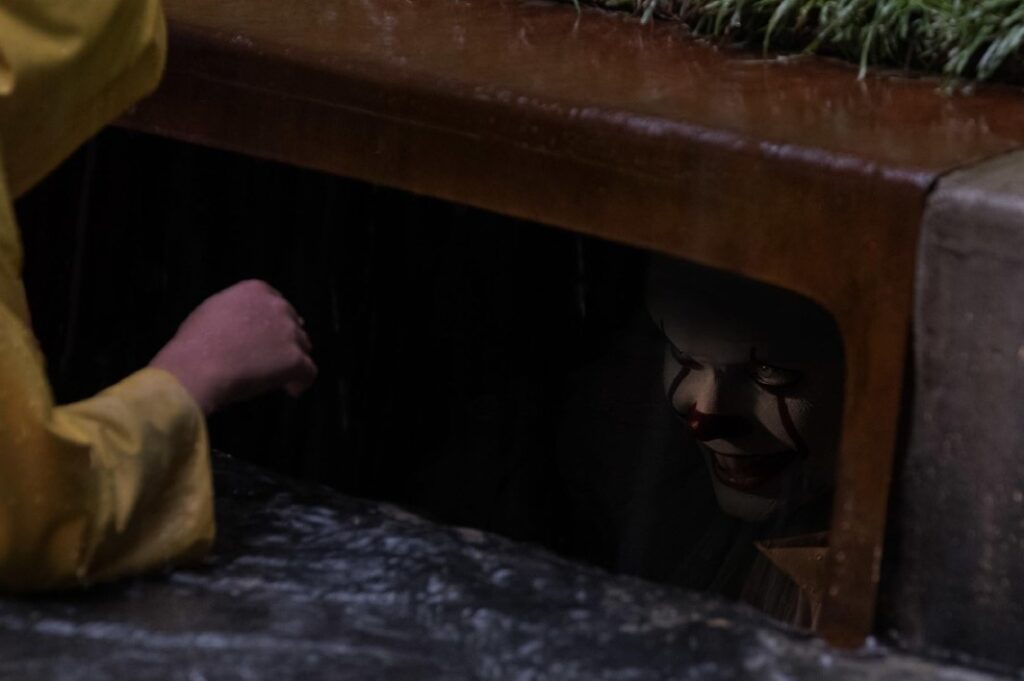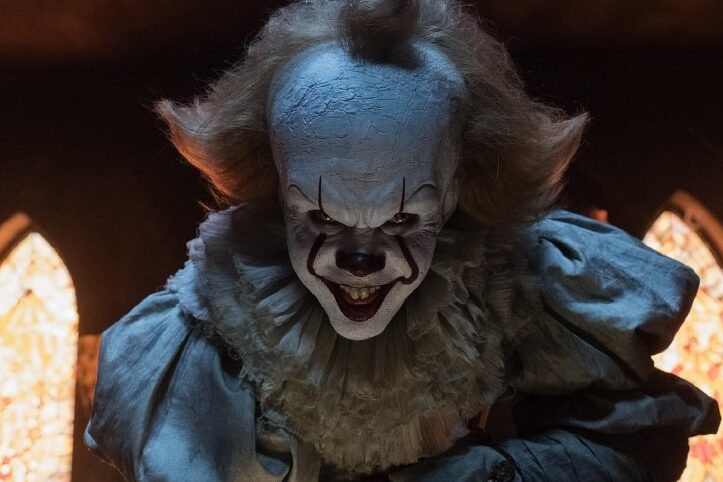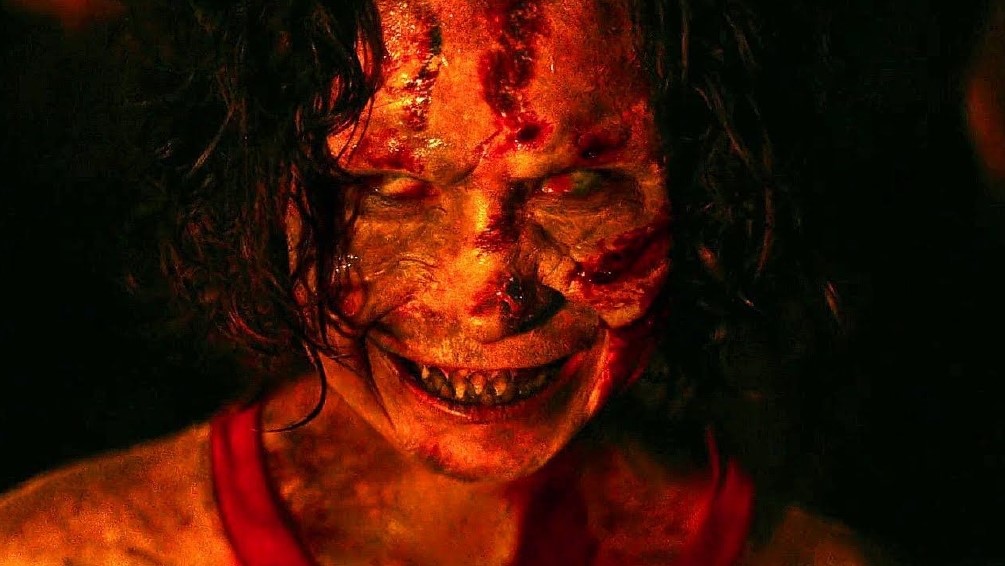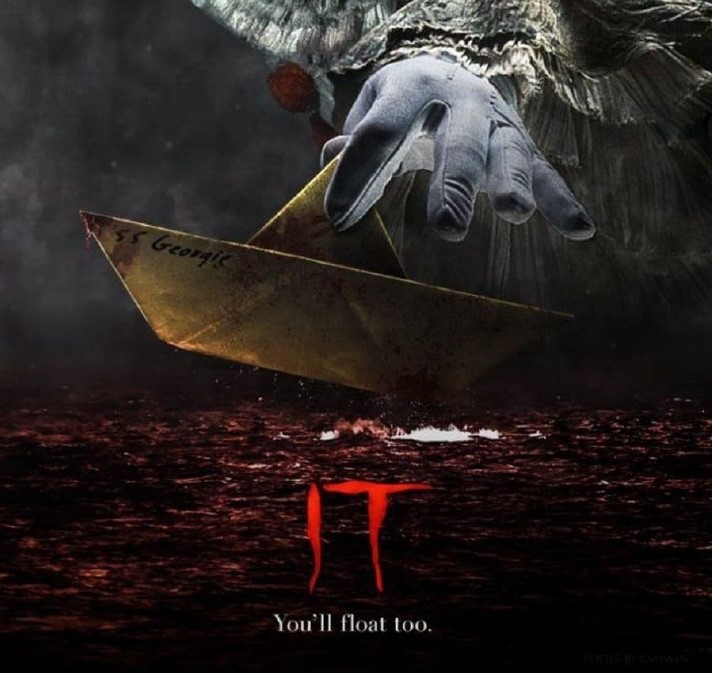IT (2017) – A Descent into Derry’s Darkest Depths
In the shadowed streets of Derry, Maine, something watches. Something waits. Directed by Andy Muschietti, IT (2017)—ripped from the cursed pages of Stephen King’s 1986 novel—drags you into a nightmare where the air hums with dread, and the sewers pulse with an ancient hunger. This isn’t just a movie; it’s a 2-hour-and-15-minute plunge into a town where children vanish like whispers, and a clown’s grin hides teeth that tear through flesh and soul.
The Nightmare Begins
It starts with rain. A paper boat skims a gutter, chased by little Georgie Denbrough (Jackson Robert Scott) in his yellow slicker. Then, from the storm drain’s black maw, a voice—too sweet, too wrong—coos his name. Pennywise the Dancing Clown (Bill Skarsgård) peers out, eyes glowing like dying stars, drool stringing from a smile that splits too wide. A balloon floats. A hand reaches. And Georgie’s scream is swallowed by the dark. He’s gone, leaving only echoes and a brother’s guilt.

Bill Denbrough (Jaeden Martell) stumbles through summer 1989, obsessed with finding Georgie. His friends—Richie (Finn Wolfhard), all bravado and brittle jokes; Eddie (Jack Dylan Grazer), choking on his own fear of sickness; and Stanley (Wyatt Oleff), clutching sanity like a fraying thread—follow him into the abyss. Soon, Beverly (Sophia Lillis), blood-soaked and defiant; Ben (Jeremy Ray Taylor), soft and haunted; and Mike (Chosen Jacobs), marked by Derry’s cruelty, join the pact. They call themselves the Losers’ Club, but something else calls them prey.
The Thing in the Shadows
Derry’s history is a graveyard of missing kids, a cycle of vanishings every 27 years, like a heartbeat from hell. Pennywise is its pulse—an entity older than the dirt under your nails, a shape-shifter that claws into your mind and wears your worst fears like a skin suit. For Eddie, it’s a leper, oozing rot and wheezing his name. For Beverly, it’s a sink vomiting blood, thick and clotting, a promise of something stalking her in her own home. For Bill, it’s Georgie, dripping wet, arm gone, whispering, “You let me die.”
The Losers don’t just see Pennywise—they feel him. He’s in the creak of floorboards, the flicker of a streetlight, the way the wind smells like rust and meat. He dances through their nightmares, a jangling, jerking thing with a laugh that splits skulls. And he’s hungry. Always hungry.

Into the Sewer’s Jaws
The terror peaks when Pennywise snatches Beverly, dragging her into the sewers—a stinking warren of bones and forgotten things. The Losers chase her, armed with nothing but desperation and each other. Down there, the walls breathe. Eyes glint in the gloom. Pennywise waits, his lair a cathedral of decay, where floating bodies drift like offerings. He lunges—teeth flashing, limbs bending wrong—promising to feast on their fear before their flesh. But the Losers fight, their screams turning to rage. They batter him, break him, send him slinking back into the dark, wounded but not dead. Not yet.
They crawl out, bloodied and bound by a pact: if he returns, so will they. The sewers stay silent, but Derry remembers.
The Faces of Fear
Bill Skarsgård’s Pennywise is a walking curse—his voice a lullaby laced with venom, his dance a mockery of joy. Those eyes, slanting and feral, bore into you; that smile promises you’ll float too. The kids are raw, real—Sophia Lillis’s Beverly burns with quiet fury, Finn Wolfhard’s Richie hides terror behind quips, Jaeden Martell’s Bill carries a grief that gnaws. They’re not just fighting a clown—they’re fighting the shadows that cling to childhood’s edges.

A Town That Watches
Muschietti paints Derry in sickly grays and bruised blues, every frame dripping with unease. The camera lingers on empty streets, on drains that gape like mouths. The scares creep up—Pennywise unfolding from a slide projector, his shadow stretching, snapping—until your pulse hammers. Benjamin Wallfisch’s score hums like a dirge, threading dread through every scene.
The Legacy of the Floaters
Unleashed on September 8, 2017, IT clawed its way to over $700 million, a blood-soaked triumph. It’s not flawless—some terrors feel too familiar—but it’s a trapdoor to a world where fear rules and friendship is the only light. It leads to IT Chapter Two (2019), where the Losers face the clown as adults, 27 years later. The cycle never ends.
Why You Can’t Look Away
IT isn’t just horror—it’s the chill of knowing something’s watching from the corner, the weight of fears you can’t outrun. Pennywise isn’t just a clown; he’s the thing under your bed, the shadow in the drain, the voice that knows your name.
